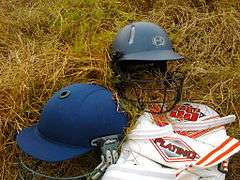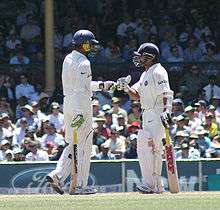Cricket helmet


In the sport of cricket, batsmen often wear a helmet to protect themselves from injury or concussion by the cricket ball, which is very hard and can be bowled to them at speeds over 90 miles per hour (140 km/h). Cricket helmets cover the whole of the skull, and have a grill or perspex visor to protect the face. Often constructed with a carbon fibre and Kevlar shell, the helmet is designed to deflect cricket balls as well as shield the wearer from impact, and its liner includes an inflatable element to tightly fit the helmet to its wearer's head.[1]
Fielders who are positioned very close to the batsman (e.g. silly point or short leg) often wear a helmet and shin guards. Nowadays it is almost unheard of for a professional cricketer to face a fast bowler without a helmet. Some batsmen prefer not to wear a helmet when facing spin bowling. In under-18 cricket they are compulsory for all batsmen and any fielder within 15 yards (14 m) of the bat.
History
There are recorded instances of cricketers using towels, scarves and padded caps to protect themselves throughout cricket history. Patsy Hendren was one of the first to use a self designed protective hat in the 1930s. Helmets were not in common use until the 1970s. The first helmets were seen in World Series Cricket, with Dennis Amiss being the first player to consistently wear a helmet.[2][3]
Mike Brearley was another player who wore his own design. Tony Greig was of the opinion that they would make cricket more dangerous by encouraging bowlers to bounce the batsmen. Graham Yallop of Australia was the first to wear a protective helmet to a test match on 17 March, 1978, when playing against West Indies at Bridgetown.[1] Later Dennis Amiss of England popularised it in Test cricket. Helmets began to be widely worn thereafter.
The last batsmen at the highest (Test match) level to never wear a helmet throughout his career was Viv Richards, who retired from the international game in 1992.
See also
| Wikimedia Commons has media related to Cricket helmets. |
- Batting helmet for baseball or softball
References
- 1 2 "England opener Michael Carberry's space-age helmet turns heads". The Daily Telegraph (Australia). News Corp Australia. 22 November 2013. Retrieved 8 December 2013.
- ↑ Briggs, Simon. "Amiss unearths helmet that changed the game". www.telegraph.co.uk. Retrieved 15 January 2013.
- ↑ "The bravery of the batsman". The Economist. 26 November 2014. Retrieved 26 November 2014.
until the late 1970s helmets were unheard of; batsmen wore nothing to protect their noggins except a cloth cap. When they began to creep into the game—Dennis Amiss, an English batsman, is usually cited as the first to wear one regularly during the 1978 World Series Cricket tournament—they were essentially adapted motorcycle helmets. Batsmen who donned them were sometimes mocked as cowards.